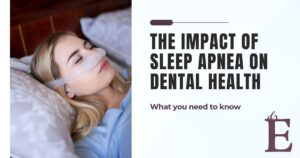Is There a Connection Between Sleep Apnea and Dental Health?
Here’s What you Need To Know
Sleep apnea is a common yet often undiagnosed condition that affects millions of people worldwide. It is characterized by repeated interruptions in breathing during sleep, which can lead to a host of health problems, including cardiovascular disease, high blood pressure, and daytime fatigue. But did you know that sleep apnea can also have a significant impact on your dental health? In this blog post, we’ll explore the connection between sleep apnea and dental health and what you can do to protect your teeth and gums.
Understanding Sleep Apnea
Sleep apnea occurs when the muscles in the throat relax excessively during sleep, causing the airway to become blocked or narrowed. This leads to periods of breathing cessation, known as apneas, which can last for several seconds to minutes and occur multiple times per hour. The most common type of sleep apnea is obstructive sleep apnea (OSA), but there is also central sleep apnea (CSA), where the brain fails to send proper signals to the muscles that control breathing.
How Sleep Apnea Affects Dental Health
- Bruxism (Teeth Grinding)
Many people with sleep apnea also suffer from bruxism, or teeth grinding, which often occurs subconsciously during sleep. The repeated grinding and clenching can wear down tooth enamel, cause tooth sensitivity, and lead to cracked or broken teeth. If left untreated, bruxism can also cause jaw pain and temporomandibular joint (TMJ) disorders.
- Dry Mouth
Sleep apnea often leads to mouth breathing, which can cause dry mouth (xerostomia). Saliva plays a crucial role in maintaining oral health by neutralizing acids produced by bacteria, washing away food particles, and aiding in the remineralization of tooth enamel. A lack of saliva can increase the risk of tooth decay, gum disease, and bad breath.
- Gum Disease
The chronic inflammation associated with sleep apnea can also contribute to the development of periodontal (gum) disease. Inflammation can weaken the body’s immune response, making it more difficult to fight off infections, including those in the gums. Research has shown a higher prevalence of gum disease in individuals with sleep apnea compared to those without the condition.
- Changes in Jaw Position
People with sleep apnea may experience changes in jaw position as their body tries to keep the airway open during sleep. This can lead to malocclusion, or misalignment of the teeth, and further exacerbate issues such as TMJ disorders and bruxism.
How Dentists Can Help
Dentists play a crucial role in the diagnosis and management of sleep apnea. During routine dental exams, they can identify signs of bruxism, dry mouth, gum disease, and other oral health issues that may be linked to sleep apnea. If sleep apnea is suspected, your dentist may recommend a sleep study or refer you to a sleep specialist for further evaluation.
One of the most effective treatments for obstructive sleep apnea is the use of oral appliances. These custom-made devices are designed to keep the airway open by repositioning the lower jaw and tongue during sleep. Oral appliances are often preferred by patients who find continuous positive airway pressure (CPAP) machines uncomfortable or intolerable.
Tips for Protecting Your Dental Health
If you have sleep apnea or suspect you might, here are some tips to help protect your dental health:
- Regular Dental Check-ups: Visit your dentist regularly for check-ups and cleanings. Inform your dentist if you have been diagnosed with sleep apnea.
- Use an Oral Appliance: If recommended by your dentist or sleep specialist, use an oral appliance to help keep your airway open and reduce the risk of bruxism.
- Stay Hydrated: Drink plenty of water throughout the day to combat dry mouth. Avoid alcohol and caffeine, which can contribute to dehydration.
- Practice Good Oral Hygiene: Brush and floss daily to remove plaque and prevent tooth decay and gum disease. Consider using a fluoride mouthwash to strengthen tooth enamel.
- Treat Gum Disease Promptly: If you have signs of gum disease, such as bleeding gums or persistent bad breath, seek treatment from your dentist immediately.
Conclusion
Sleep apnea is more than just a sleep disorder; it has far-reaching implications for your overall health, including your dental health. By understanding the connection between sleep apnea and dental health, you can take proactive steps to protect your teeth and gums. Regular dental visits, good oral hygiene, and appropriate treatment for sleep apnea can help you maintain a healthy smile and improve your quality of life.
At Dr. E’s Cosmetic & Family Dentistry, we are committed to providing comprehensive care for all aspects of your dental health. If you have concerns about sleep apnea or its impact on your oral health, don’t hesitate to contact us for a consultation. We’re here to help you achieve a healthier, happier smile. Call us at 480-494-2435.


